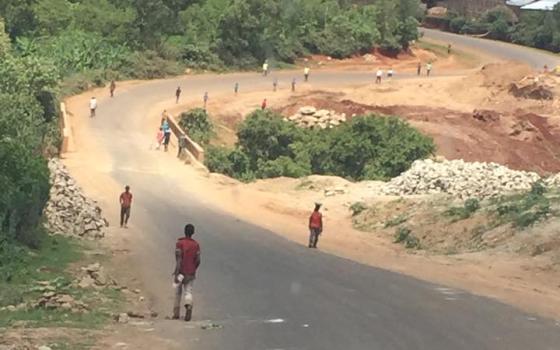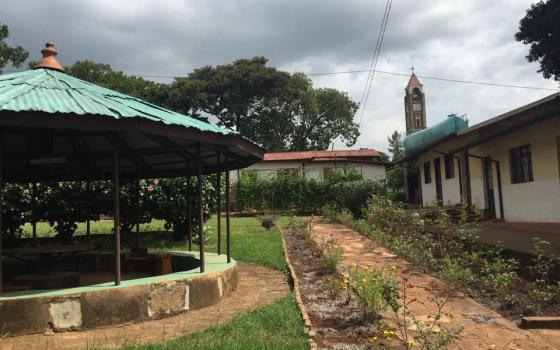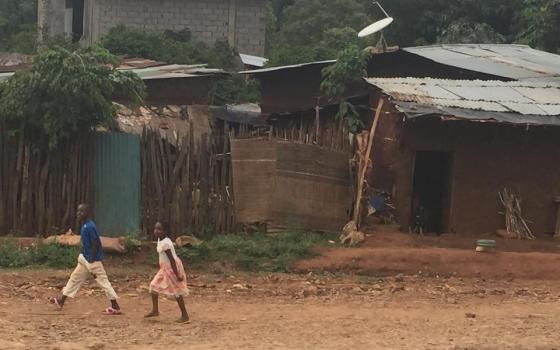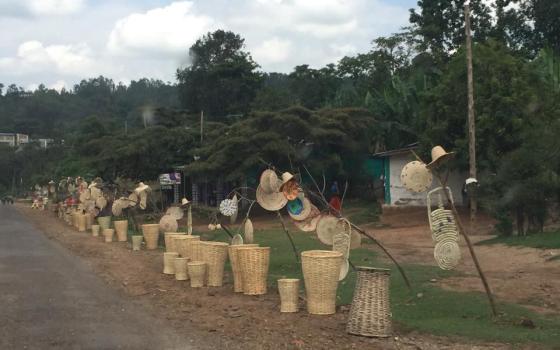Notes from the Field is GSR’s summer blogging project. Working with the Catholic Volunteer Network, we’ve enlisted four young women working in ministries of Catholic sisters around the world – Honduras, Thailand, Ethiopia and the United States – to blog about their experiences, each for six weeks.
_____
“Mission: an important assignment given to a person or group of people”
(Source: Oxford online dictionary)
St. John Bosco says, “it is not enough that you love the young, they must know they are loved.” This is the mission of the Salesian sisters: to love and to educate youth.
In my last year of college, I decided that I wanted to go on a mission trip after graduation. The next step was to figure out how to make that happen. So I went on the Catholic Volunteer Network website, where I found a program, VIDES, that looked promising and also had its main office located in the town I was living in. Everything started from there.
Before my mission, I attended a formation program in San Antonio with the Salesian sisters, who host VIDES volunteers. The formation consisted of one week of talks, readings and reflections and another week putting what we learned into practice by running a bible camp. In March, I joined the Salesian sisters’ mission in Dilla, Ethiopia.
Dilla is a small town in southern Ethiopia. The main road leading into the business area of the town is being paved, hence there is a lot of construction and dust, around the sisters’ compound. In the town there are a few banks and hotels but many small businesses. Dilla also has many factories, including ones that process flour and coffee. Students come from villages to study at the university and colleges here.
The mission here was taken over by the Salesian sisters in the mid-1980s. Initially, four sisters ran the mission, helping manage two kindergarten classes and the infirmary. A few years later, they started a sewing class and, after a while, a computer course. The Salesian sisters also have significantly expanded the mission’s compound. One of the newest buildings is the clinic and a play area under construction will allow children a place to participate in sports and games.
A Salesian priests’ compound is next door, so I can see the parish church from my window and it only takes a couple minutes to walk to Mass in the early morning. During Mass, women here cover their head with a “netela,” which is a big white shawl with embroidery at the ends.
One custom that differs from what I am used to in the United States is the sign of peace at Sunday Mass. Here children leave their pews and weave around the church to shake hands with all the people. The priest also leaves the altar to give the sign of peace to the congregation. The commotion lasts till the children return to their pews. Honestly, I always seem to have the image of rushing water in my mind when I see the children coming towards me.
During Mass, the doors and windows of the church are often left open to welcome in the cool air. But this sometimes welcomes in other things, like birds, which wildly circle overhead like over-caffeinated creatures. Either the birds are eating coffee beans off the plants outside or they are extracting energy from the drumming and lively singing of the congregation.
The coffee plant is one of the many plants in the mission, and it is famous in Ethiopia. There is a legend here about Kaldi, a goat herder, who is said to have discovered coffee after his goats grazed in a field with coffee plants and were filled with energy. So, all you coffee lovers out there – and people who need it to get of bed in the morning – you can say a quick prayer to God for Ethiopia and her people.
Moreover, come to Ethiopia! There are coffee ceremonies here! Whenever there is a celebration, a guest visiting, or a special event, the people here will lay reeds on the ground, burn incense and roast, grind and boil the coffee on top of a small charcoal fire. Around the coffee pot, called jebena, there will be pretty baskets with popcorn and biscuits. Then everyone will eat and drink and enjoy the smells and company.
During the coffee ceremony, the women usually make the coffee with sugar, but people told me that they will also make their coffee with butter and salt. I had never heard of putting those ingredients in coffee, but I am willing to try it.
Of the many fruits that grow here, the favorites of the little children that wander around the mission are the mango trees. Whenever I encounter a little child, they look up at me with big eyes, and say “Mango?” Also, when they don’t think anyone is looking, they sneak into the compound and throw rocks at the trees to make the mangoes fall, never knowing I am peeking at them through the window. In addition to mangoes, there are also papayas, pineapples and avocados growing in the mission’s compound.
The compound is very well maintained, and the sisters provide jobs by hiring people to clean and tend the grounds. During the rainy season, when the grass grows tall, they hire seasonal help. Since they don’t have a lawn mower, the grass is cut by hand, in this big compound, with a sickle. All together, the sisters employ more than 80 people, including teachers, nurses, cooks and watchmen.
The mission contributes greatly to the development of Dilla by educating youth and teaching skills to help them become self-sustainable and hirable; most of the graduates from their college, situated in the compound, get jobs shortly after graduation. The sisters here are meeting an important assignment given to them, and I am happy to have an” inside look” and to contribute in some small way to their mission here in beautiful Dilla, Ethiopia.
[Angela Mahoney is a VIDES volunteer in Ethiopia. She is there teaching Communications and English, and on Sundays she helps the sisters with the Oratory for children.]




